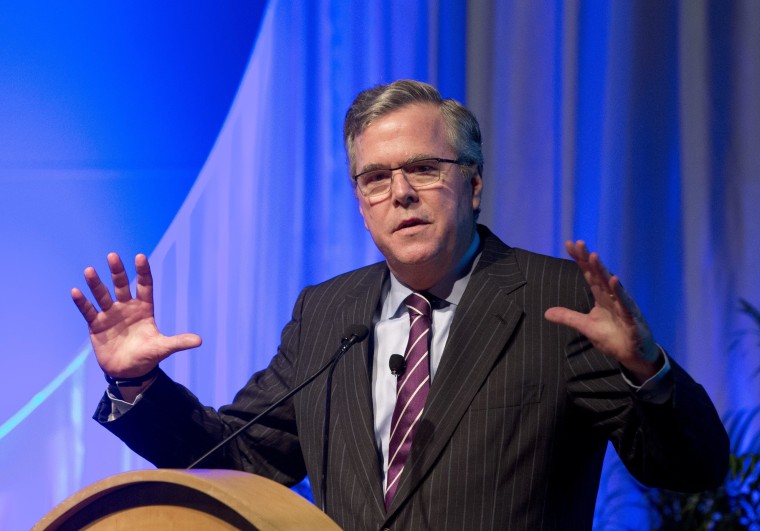Jeb Bush is now even closer to a 2016 presidential run, after announcing Tuesday that he is “actively” exploring a White House bid. And our new NBC/WSJ poll reveals why he appears to be doing this so early: He has A LOT of work to do. Despite having nearly perfect name identification, he’s more popular -- at least right now -- among the Beltway crowd and deep-pocketed GOP donors than he is among most American voters. According to our poll, just 31% of all voters say they could see themselves supporting him for president, while 57% say they can’t. He’s more popular among Republicans (55% support, 34% can’t support), which is the second-best GOP score in the poll behind Mitt Romney (see at the bottom). But he fares worse among Democrats (9%-79%) and, more importantly, independents (34%-52%). These numbers follow our Nov. 2014 NBC/WSJ poll, which found Bush’s fav/unfav rating at a net-negative 26%-33%. Of course, this is all subject to change. We could see how Bush -- if he runs and bests his GOP competition -- could improve his numbers among Republicans and some independents. Nothing can change polling numbers like success. But right now, he’s not Mr. Popular (in large part, we think, because of his last name). And it’s going to take time for him to become Jeb and not a Bush.
Hillary’s your early 2016 frontrunner -- but barely
It’s instructive to compare Jeb’s numbers in our NBC/WSJ poll to Hillary Clinton’s: 50% say they could see themselves supporting her if she runs, versus 48% who oppose her. To us, those numbers sure look like what you might see in a general election less than two years from now. (President Obama beat Mitt Romney 51%-47% in the 2012 presidential election.) So you see both Hillary’s floor and ceiling. We couldn’t imagine her getting more than 50%-51% in a general election, but we also couldn’t see her getting less than 48%-49%. Her challenge, however, is a different one: A whopping 71% of American voters want the next president to take a different approach than Obama’s; Clinton served as his first-term secretary of state. And by 40% to 38%, voters prefer a Republican to win the White House in 2016 instead of a Democrat. “This is an electorate --by a large margin -- looking for change,” says Republican pollster Bill McInturff, who conducted this survey with Democratic pollster Peter Hart and his colleagues at Hart Research Associates.
Hillary’s also your big leader among Democratic voters
Still, Clinton has a substantial lead among Democratic voters -- 82% say they could see themselves supporting if she runs, versus 15% who can’t. By contrast, Elizabeth Warren (37% support, 25 percent oppose) and Vice President Joe Biden (51% support, 41% oppose) have less appeal among Democrats. These numbers -- like others before them – should quiet liberals and political observers who are pining for an Elizabeth Warren challenge. Yes, Warren does well among the same Democratic groups who backed Bill Bradley in 2000 and Paul Tsongas before him. But guess what: Those folks didn’t win.
Why Hillary needs Jeb (and vice versa)
Jeb’s early move is good news for Hillary Clinton. Why? One, it rallies Democrats, who might be a bit despondent after their midterm losses. (What fires them up more than the opportunity to run against another Bush?) Two, Bush gives Clinton something/someone to run AGAINST. And three, Bush getting into the race makes him have to share the dynastic/legacy card with her. Bottom line: Hillary needs Jeb. And vice versa, Jeb needs Hillary. Both of their rationales for running are easier with them both in the race.
Breaking down our 2016 polling -- can you see yourselves supporting or opposing this particular candidate?
Among all voters
- Hillary Clinton 50%-48% (+2)
- Jim Webb 9%-24% (-15)
- Rand Paul 30%-47% (-17)
- Martin O’Malley 4%-21% (-17)
- Scott Walker 15%-32% (-17)
- Elizabeth Warren 22%-40% (-18)
- Bernie Sanders 10%-30% (-20)
- Marco Rubio 20%-43% (-23)
- Jeb Bush 31%-57% (-26)
- Chris Christie 27%-53% (-26)
- Mitt Romney 33%-60% (-27)
- Ted Cruz 17%-44% (-27)
- Mike Huckabee 25%-53% (-28)
- Rick Perry 19%-52% (-33)
- Joe Biden 29%-64% (-35)
Among Democrats
- Hillary Clinton 82%-15% (+67)
- Elizabeth Warren 37%-25% (+12)
- Joe Biden 51%-41% (+10)
- Jim Webb 13%-21% (-8)
- Bernie Sanders 18%-28% (-10)
- Martin O’Malley 7%-21% (-14)
Among Republicans
- Mitt Romney 63%-33% (+30)
- Jeb Bush 55%-34% (+21)
- Rand Paul 47%-34% (+13)
- Marco Rubio 39%-28% (+11)
- Scott Walker 29%-20% (+9)
- Mike Huckabee 47%-39% (+8)
- Ted Cruz 34%-33% (+1)
- Chris Christie 40%-43% (-3)
- Rick Perry 35%-39% (-4)
Among independents
- Hillary Clinton 45%-52% (-7)
- Rand Paul 29%-42% (-13)
- Martin O’Malley 3%-17% (-14)
- Jeb Bush 34%-52% (-18)
- Scott Walker 11%-32% (-21)
- Chris Christie 27%-49% (-22)
- Jim Webb 7%-29% (-22)
- Elizabeth Warren 16%-42% (-26)
- Bernie Sanders 7%-33% (-26)
- Mitt Romney 29%-60% (-31)
- Ted Cruz 11%-43% (-32)
- Marco Rubio 12%-46% (-34)
- Mike Huckabee 20%-55% (-35)
- Rick Perry 13%-53% (-40)
- Joe Biden 19%-71% (-52)
Click here to sign up for First Read emails. Text FIRST to 622639, to sign up for First Read alerts to your mobile phone. Check us out on Facebook and also on Twitter. Follow us @chucktodd, @mmurraypolitics, @carrienbcnews
